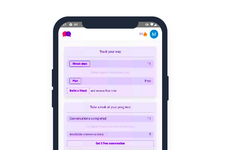
Heaven's Vault Created its Own Language For Players to Explore
Justin Lam — April 6, 2018 — Tech
References: inklestudios & theverge
At first glance, Heaven's Vault appears to be a typical video game. Players take control of a woman named Aliya Elasra, accompanied by her robot Six, and set off on a adventure that features the exploration of several moons that once housed and ancient civilization. The concept sounds fairly cut-and-dry, but the game is actually incredibly innovative as players won't be facing combat with aliens. Instead, players will be tasked with decoding and translating the words and messages left behind by ancient alien civilizations.
A language was actually created for the game and features around 1,000 words. The developers, inkle, describe the language as “logically constructed,” with each symbol being carefully construed and strung together without any randomness. The language created for Heaven's Vault was constructed from other image-heavy languages such as Chinese and German, with smaller words often being combined to create a larger concept.
A language was actually created for the game and features around 1,000 words. The developers, inkle, describe the language as “logically constructed,” with each symbol being carefully construed and strung together without any randomness. The language created for Heaven's Vault was constructed from other image-heavy languages such as Chinese and German, with smaller words often being combined to create a larger concept.
Trend Themes
1. Constructed Languages in Gaming - Creating unique languages in video games offers an opportunity for immersive and innovative gameplay experiences.
2. Language Learning Through Gaming - Incorporating language puzzles and translation challenges in games can provide a fun and engaging way to learn new languages.
3. Decoding and Translation Games - Designing gameplay around decoding and translating ancient messages opens up new possibilities for storytelling and exploration.
Industry Implications
1. Video Game Development - Developing games with unique and intricately constructed languages can foster greater player engagement and expand the potential for new game mechanics.
2. Language Learning and Education - Integrating language puzzles and challenges into educational games can enhance language learning outcomes and make the process more enjoyable for learners.
3. Storytelling and Entertainment - Incorporating decoding and translation elements in storytelling mediums, such as books, movies, or interactive experiences, adds layers of intrigue and encourages audience interaction.
0.6
Score
Popularity
Activity
Freshness























